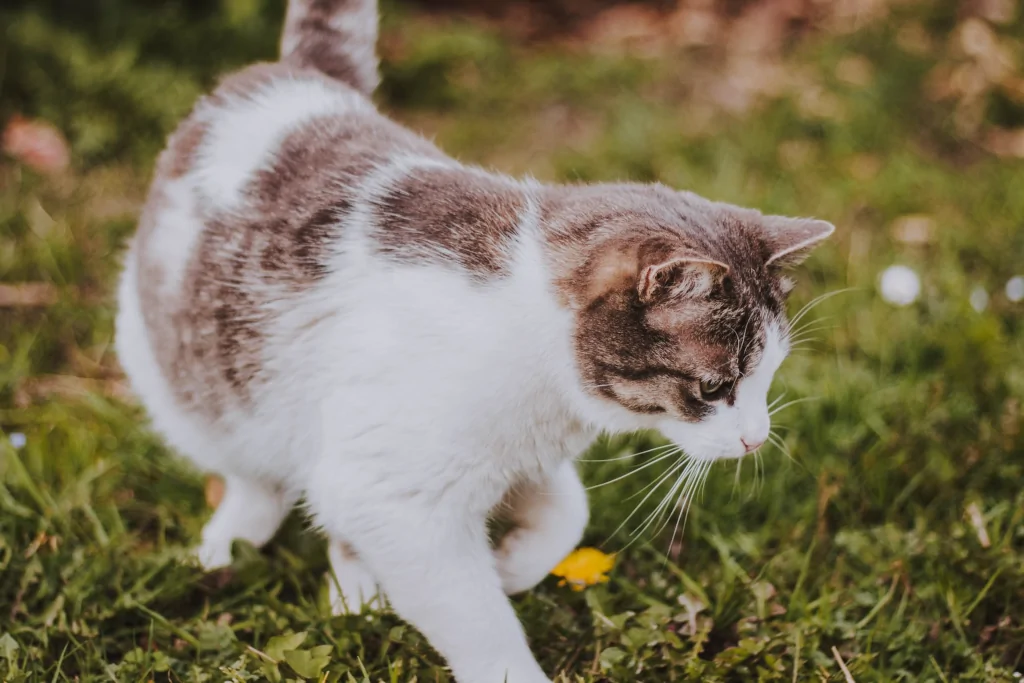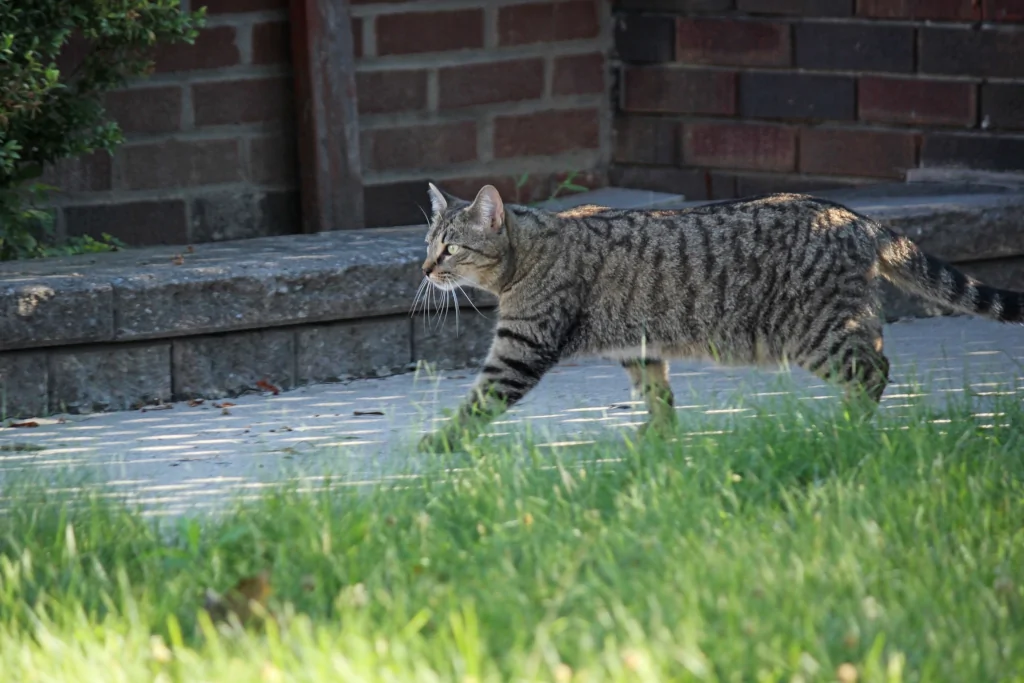Have you ever wondered if your beloved house cat could survive in the wild? It’s a natural curiosity for cat owners, but the answer might surprise you.
The reasons behind this are fascinating and could help you understand your feline friend even better.

Can a House Cat Survive Outside or in the Wild?
While house cats possess some skills that could help them survive outdoors or in the wild, their domestication has significantly reduced their ability to thrive in such environments.
Unlike wild cats, they have become accustomed to a life of comfort, regular meals, and safety from predators. Venturing outside or being released into the wild exposes them to numerous threats and challenges that they’re not well-prepared for.
In the following sections, we’ll explore the factors that make survival difficult for our feline companions and why releasing them into the wild is not recommended.
Comparing Domestic Cats to Their Wild Counterparts
Genetic Differences
Domestic cats and their wild counterparts share a common ancestor, the African wildcat, but thousands of years of domestication have led to genetic differences between the two.
These genetic variations mean that house cats have adapted to living with humans, relying on us for food, shelter, and companionship. In contrast, wild cats have evolved to survive in their natural habitat, developing hunting skills, self-sufficiency, and adaptability to changing conditions.
Hunting Skills
While domestic cats still possess the instincts to hunt, they often lack the refined skills of their wild counterparts.
House cats typically engage in play-hunting, which may not be as effective in capturing real prey. They may rely on food provided by humans, making them less proficient at stalking and capturing prey. In addition, they may also struggle with identifying and avoiding dangerous prey, such as venomous snakes or larger animals.
On the other hand, wild cats like the bobcat or lynx have honed their hunting techniques to ensure their survival in the wild.
Socialization and Territorial Behavior
Domestic cats have become more social due to living with humans and other pets.
However, this socialization may not benefit them in the wild, where they might need to compete with other animals for resources.
This increased sociability may lead to domestic cats being more vulnerable to attacks from other animals, as they might not be as cautious or defensive as their wild counterparts. They may also struggle to establish territories and protect resources.
Wild cats tend to be solitary and territorial, a trait that enables them to defend their hunting grounds and avoid unnecessary conflicts.
Physical Adaptations
Wild cats often possess physical adaptations that house cats lack, such as larger bodies, stronger muscles, and specialized teeth and claws. These adaptations enable wild cats to take down larger prey and thrive in harsh environments.
House cats may also lack the ability to efficiently regulate their body temperature in extreme climates, putting them at risk of heatstroke or hypothermia. Their smaller, less muscular bodies make them more vulnerable to predators and less able to handle larger prey.
Why house cats fail in hunt:

Dangers House Cats May Face in the Wild
Exposure to Predators
One of the most significant dangers house cats face in the wild is exposure to predators. Larger animals like coyotes, foxes, and birds of prey may view house cats as potential meals.
Domestic cats lack the physical adaptations and experience to defend themselves against these predators, putting them at a considerable disadvantage.
Starvation and Malnutrition
Domestic cats are used to being fed by their owners and may struggle to find food sources in the wild. Hunting skills are often underdeveloped, and house cats may not recognize edible plants or insects. This lack of knowledge and skill can lead to malnutrition and even starvation.
Disease and Parasites
House cats are more susceptible to diseases and parasites in the wild. Vaccinations are a necessity, especially for outdoor cats.
Exposure to other animals, contaminated water sources, and parasites like fleas and ticks can result in various health issues, such as feline leukemia, feline immunodeficiency virus, and various bacterial infections. Domestic cats may lack the necessary immunity to fight off these diseases.
Injuries and Accidents
In the wild, house cats can encounter numerous hazards that can lead to injury or death. These dangers include traffic accidents, falling from heights, and getting caught in traps set for other animals.
Without the proper survival skills and experience, house cats are more prone to accidents.
My friend found this cat…
This poor animal’s plight is a reminder of how challenging life in the wild can be for house cats. My friend took the cat to the vet for treatment and eventually found a loving home for it, but not all domestic cats in the wild have such fortunate outcomes.
Why Releasing a Domestic Cat Into the Wild Is Not Recommended
Releasing a domestic cat into the wild exposes them to numerous dangers and hardships, as previously discussed.
The lack of survival skills and experience makes it difficult for them to fend for themselves. Additionally, domestic cats can have a negative impact on local wildlife populations, as they may hunt native species and disrupt ecosystems.
Better Alternative is Rehoming
If you can no longer care for your cat, there are better alternatives to releasing them into the wild.
Consider reaching out to friends, family, or coworkers to find a new home for your cat. Local animal shelters, rescue organizations, or online adoption platforms can also assist in finding a suitable home. Your is called “rehoming a pet” for which you might want to ask a “rehoming fee“, as well.
FAQs
How long can a house cat survive outdoors without human intervention?
A house cat’s survival outdoors depends on various factors, but generally, they can survive for a few weeks to several months in urban and suburban areas. In the countryside, their survival may be shorter, and even more so in completely wild environments.
What are the most common threats to house cats in the wild?
Common threats to house cats in the wild include predators, starvation, disease, parasites, injuries, and accidents.
Can house cats adapt to hunting for their own food?
Some house cats may adapt to hunting for their own food, but many lack the necessary skills and experience, which can lead to malnutrition and starvation.
Is it legal to release a house cat into the wild?
Laws vary by location, but releasing a house cat into the wild is often illegal and considered animal abandonment, which may result in penalties or fines.
Alex, a passionate animal lover, has experience in training and understanding animal behavior. As a proud pet parent to two dogs and three cats, he founded AnimalReport.net to share insights from animal experts and expand his knowledge of the animal kingdom.




